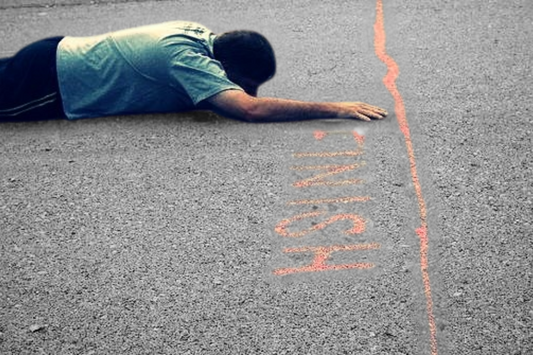You know that feeling when everything just feels... off? Not bad, not good—just kind of there. Like you’re on autopilot, going through the motions but not really present. Maybe you’re scrolling mindlessly, watching a show you don’t even care about, or staring at your laptop, hoping inspiration strikes. You’re not miserable, but joy feels just out of reach.
You think, “I’m fine. I’m not sad. I’m still getting things done.” But something’s missing. That spark, that energy, that sense of being truly engaged. If this sounds familiar, you might be experiencing languishing—a state of stagnation and aimlessness, where you exist but don’t quite thrive (Grant, 2021).
Aditi (name changed) had a great job, loving family, and a social life that looked picture-perfect. But something felt off. “It was like I was moving through a haze,” she said during one of our conversations. “I wasn’t unhappy, but I wasn’t excited about anything either. I used to love painting, but even picking up a brush felt like too much effort.”
Psychologist Adam Grant (2021) calls languishing the “neglected middle child” of mental health. It’s not depression, where everything feels dark and overwhelming, but it’s also far from flourishing, which the American Psychological Association defines as a state of well-being, vitality, and a strong sense of purpose (Keyes, 2002). It’s like you’re living the same day on repeat, waiting for something to change.
Why This Feeling Matters
Languishing is tricky because it doesn’t demand attention like sadness or anxiety. It sneaks up on you, slowly draining your energy and enthusiasm. Research even suggests that people who experience prolonged languishing are at a higher risk of developing depression later on (Keyes, 2007). It’s like a slow fade, dimming your sense of self over time.
So how do we snap out of it?
The Key to Breaking Free: Finding Flow
Grant found his way out of languishing in an unexpected way—by playing Mario Kart with his family. At first glance, it seems trivial, but it helped him find flow—a state of deep, effortless engagement.
Flow, a term coined by psychologist Mihaly Csikszentmihalyi (1990), describes those moments when you’re so absorbed in something that time just flies. It’s that feeling when you’re completely immersed in a book, lost in a painting, or deeply engaged in a conversation. It’s not just about passing the time—it’s about feeling fully alive.
The Difference Between Binge-Watching and Flow
At first, flow might sound like binge-watching your favorite show. But there’s a big difference. Bingeing is passive—it numbs you, offering a temporary escape. Flow, on the other hand, is active—it challenges and engages you, leaving you feeling fulfilled instead of drained.
The Three Ingredients of Flow
Grant (2021) highlights three essential elements that help create flow and pull you out of languishing:
Mastery – Making progress, even in small ways, can spark joy. It doesn’t have to be a major achievement—just little wins that add up. For Aditi, it was simply mixing colors again, no pressure to create anything perfect.
Mindfulness – Flow happens when you’re fully engaged. That means shutting out distractions and giving your full attention to one thing at a time.
Mattering – Doing something that has meaning or connects you to others can reignite your sense of purpose. Volunteering, mentoring, or even sharing a small creative project with someone can help you feel more alive.
Simple Ways to Invite Flow into Your Life
If you’re feeling stuck in languishing, here are a few small steps you can take:
Reignite an old passion. Think back to something that once made you happy—playing an instrument, writing, baking, painting. Start small, even if it’s just for five minutes.
Give yourself uninterrupted time. Flow needs space. Put your phone on silent, turn off notifications, and focus on one task at a time.
Celebrate small wins. Mastery isn’t about being the best—it’s about making progress. Give yourself credit for the little things.
Connect with something bigger. Whether it’s a conversation with a friend, a group activity, or working on something that helps others, meaning fuels engagement.
Breaking Free from the Blah
Languishing isn’t a life sentence, and it doesn’t mean you’re broken. It just means you need to reconnect—with yourself, with what excites you, and with the activities that bring meaning to your life. Flow is the antidote, and you don’t need a massive life change to find it. Small, intentional steps can help you feel more engaged, more alive.
So, next time you catch yourself zoning out on social media, ask yourself: What’s one small thing I can do today that might make me feel more present?
Maybe it’s sketching for five minutes. Maybe it’s dancing around your living room. Maybe it’s calling a friend just to chat. Whatever it is, flow is waiting for you—ready to pull you out of the blah and back into something real.
And hey, maybe a round of Mario Kart is a good place to start.
References
Csikszentmihalyi, M. (1990). Flow: The psychology of optimal experience. Harper & Row.
Grant, A. (2021, December 3). There’s a name for the blah you’re feeling: It’s called languishing. The New York Times. https://www.nytimes.com/2021/04/19/well/mind/covid-mental-health-languishing.html
Keyes, C. L. M. (2002). The mental health continuum: From languishing to flourishing in life. Journal of Health and Social Behavior, 43(2), 207–222.
Keyes, C. L. M. (2007). Promoting and protecting mental health as flourishing: A complementary strategy for improving national mental health. American Psychologist, 62(2), 95–108.




